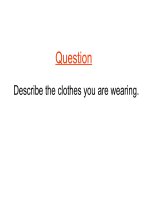Unit 2 Clothing exercises
Bạn đang xem bản rút gọn của tài liệu. Xem và tải ngay bản đầy đủ của tài liệu tại đây (222.73 KB, 10 trang )
LỚP HỌC TT102
Địa chỉ: 23/176 Nguyễn Lân - Thanh Xuân - H- Nội
Fanpage: Lớp học TT102 - Hotline: 094 494 0880 - Zalo: 094 494 0880
UNIT 2 - CLOTHING
I.
1.
Fill in each blank with one appropriate word from the box.
musicians
poet
baggy
designer
material
casual
plain
symbol
patterns
generation
Walt Whitman is an American ..................... His collection of poems, Leaves of Grass,
was very famous.
2.
We attended the fashion show of a leading .......................
3.
The older ......................... prefer a darker and more traditional kind of clothing.
4.
What ..................... is this dress made of? - Cotton.
5.
The dove is a universal ...................... of peace.
6.
......................... clothes are very loose on your body.
7.
People who become ....................... often learn how to play an instrument at an early age.
8.
Some students said they prefered wearing .......................... uniforms.
9.
He was wearing a ...................... white shirt and a pair of faded jeans.
10. The carpet was old, with strange ...................... on it.
II. Complete the sentences with the correct form of the words in brackets.
1.
The ao dai is the ........................ dress of Vietnamese women. (tradition)
2.
Traveling by subway is fast, ........................... , and cheap. (convenience)
3.
The program examine the role of women in ....................... society. (modernize)
4.
Dreams are a rich source of ......................... for some writers. (inspire)
5.
Don't you believe in ...................... between men and women? (equal)
6.
I need you there to offer words of ....................... . (encourage)
7.
She offered him an ...................... handkerchief. (embroider)
8.
It's ............................ to wear T-shirts and faded jeans. (fashion)
9.
I wear my school uniform with ...................... . (proud)
10. The worldwide .............................. situation is getting worse and worse. (economy)
III. Put ever, never, for or since into each gap.
1.
I haven't seen Keith .................. Christmas.
2.
She's been in China ................... a long time, but she's .................. visited the Great Wall.
3.
He's worked for this company ...................... many years, 1976, I guess.
4.
We've been friends ......................... we were children, and I've ................... liked anyone
as much as I like him.
Sưu tầm và đáp án: Đào Trọng Linh
1
LỚP HỌC TT102
Địa chỉ: 23/176 Nguyễn Lân - Thanh Xuân - H- Nội
Fanpage: Lớp học TT102 - Hotline: 094 494 0880 - Zalo: 094 494 0880
5.
I've known him ........................ over ten years, but I've .................... met his parents.
6.
We haven't had a barbecue last summer. Have you .................... had a barbecue?
7.
His wife, Carrie, is a designer. She has her own studio .................. six months, 8th June.
8.
My uncle has been at my house yesterday. Have you ................... met him? No, ................
9.
I've known him ................. ages, but I haven't seen him ................... I was at university.
IV. Put in the present perfect or past simple of the verbs in brackets.
1.
I (have).................... these shoes since my eighteen birthday.
2.
We (live).................... in Newcastle for three years now and like it a lot.
3.
The last time I (go).................... to Brighton was in August.
4.
When my parents were on holiday, I (stay).................... with my grandparents for two
weeks.
5.
I (not see).................... Rachel for ages. She (not visit).................... us since July.
6.
Martin (be).................... to Greek five times. He loves the place.
7.
I (work).................... for a computer company for a year. That was after college.
8.
We (move).................... here in 1993. We (be).................... here a long time now.
9.
It isn't a very good party. Most people (already/ go).................... home.
10. It was so hot today that I (wear)..................... shorts and a T-shirt at work.
11. My wife and I (move).................... three times since we (get).................... married.
12. So far this week there (be).................... three burglaries in our street.
13. When I was younger I (play).................... badminton for my local team.
14. In the past few years, it (become).................... more and more difficult to get into
university.
15. This book is so long that I (not finish).................... it yet.
V. Complete the sentences, using the correct form of the verbs in brackets.
1.
I (study).................... at Le Hong Phong high school from 1998 to 2001.
2.
We (not see).................... Jack for a long time. It's twenty years since we last
(see).................... him.
3.
My brother (work).................... as a travel agent for ten years now.
4.
The children (play).................... happily in the park when I found them.
5.
(Bill/ arrive).................... home yet? - Yes. He (arrive).................... three hours ago.
6.
I (like).................... cowboy movie since I was a child.
7.
I'll come and see you before I (leave).................... for the United States.
8.
We (have).................... four tests so far this semester.
Sưu tầm và đáp án: Đào Trọng Linh
2
LỚP HỌC TT102
Địa chỉ: 23/176 Nguyễn Lân - Thanh Xuân - H- Nội
Fanpage: Lớp học TT102 - Hotline: 094 494 0880 - Zalo: 094 494 0880
9.
As soon as Martina saw the fire, she (phone).................... the fire department.
10. I saw Lisa at the station when I (go).................... to work this morning but she (not/
see).................... me.
11. I (know).................... Jim Bates since he (be).................... ten years old.
12. He will take a dog out for a walk as soon as he (finish).................... his work.
13. We (not see).................... Marta recently. The last time we (meet).................... her was in
April.
14. Kathy usually (sit).................... in the front row during class, but today she
(sit).................... in the last row.
15. A: Look! It (snow).................... .
B: It's beautiful! This is the first time I (ever/ see).................... snow. It (not
snow).................... in my country.
VI. Write the second sentence so that it has a similar meaning to the first. Use the
passive form.
1.
Somebody has cleaned the room.
................................................................................................................................................
2.
They cancelled all flights because of fog.
................................................................................................................................................
3.
Bill is using the computer at the moment.
................................................................................................................................................
4.
They pay designers a lot of money.
................................................................................................................................................
5.
When did they decorate your kitchen?
................................................................................................................................................
6.
We have to test these products.
................................................................................................................................................
7.
Somebody was recording our conversations.
................................................................................................................................................
8.
How do people pronounce this word?
................................................................................................................................................
9.
The police will tow away cars left here.
................................................................................................................................................
10. The situation is serious. We must do something before it's too late.
Sưu tầm và đáp án: Đào Trọng Linh
3
LỚP HỌC TT102
Địa chỉ: 23/176 Nguyễn Lân - Thanh Xuân - H- Nội
Fanpage: Lớp học TT102 - Hotline: 094 494 0880 - Zalo: 094 494 0880
................................................................................................................................................
11. They have postponed the concert.
................................................................................................................................................
12. They are going to build a new supermarket next year.
................................................................................................................................................
13. Has your father repaired the car?
................................................................................................................................................
14. They export bananas to Europe.
................................................................................................................................................
15. You can find flowers in almost every part of the world.
................................................................................................................................................
VII. Put the verb into the most suitable passive form.
1.
Yesterday our teacher arrived twenty minutes late because he (catch)..................... in a
traffic jam.
2.
The morning paper (read)..................... by over 200,000 people every day.
3.
Her electricity (cut)..................... off when she didn't pay her bill.
4.
The room (clean)..................... when I arrived.
5.
A new house (build)..................... next to ours next year.
6.
The letters (type/ already)..................... by the secretary.
7.
That letter is important. It (ought to/ type)..................... on letterhead stationery.
8.
Our class (teach)..................... by Mr. Rice right now.
9.
Many accidents (cause)..................... by dangerous driving.
10. The television (repair)..................... . It's working again now.
VIII. Put the verb in brackets in correct tense, active or passive.
NYLON - The first man-made fiber
Nylon (invent).................... in the early 19805 by an American chemist, Julian Hill. Other
scientists (work).................... with his invention and finally on 27 October 1938, Nylon
(introduce).................... to the world. It was cheap and strong and immediately
(become).................... successful, especially in making of ladies' stocking.
During the Second World War, the best present for many women (be).................... a pair of
nylon stockings, but more importantly, it (use).................... to make parachutes and tyres.
Today, nylon (find).................... in many things: carpets, ropes, seat belts, furniture,
computers, and even spare parts for the human body. It (play).................... an important part
Sưu tầm và đáp án: Đào Trọng Linh
4
LỚP HỌC TT102
Địa chỉ: 23/176 Nguyễn Lân - Thanh Xuân - H- Nội
Fanpage: Lớp học TT102 - Hotline: 094 494 0880 - Zalo: 094 494 0880
in
our
lives
for
over
50
years.
Next
year
about
36
million
tons
of
it
(manufacture).....................
IX. Put a preposition into each gap.
1.
The boy looks very proud ................ his success at school.
2.
I think it's necessary ................. students to wear uniforms when they are .................
school.
3.
Shall we go for a picnic tomorrow? - It depends ................. the weather.
4.
The park was named .................... a young hero, Le Van Tam.
5.
In the 18th century jean cloth was made completely .................... cotton.
6.
Children's shoes usually wear .................... very quickly.
7.
The price of oil has gone ................... by over 3Wk.
8.
Vietnamese women today often wear modern clothing ................ work, but wear ao
dai .................. special occasions.
9.
Jeans have never been ................ ............... fashion. Are you fond .................. wearing
jeans?
10. This job is a lot different ................... what I'm used to.
X. Read the passage, and then decide whether the following statements are true or
false.
I lived in the Middle East for a while, and when I went out, I had to obey the local custom of
wearing something over my head and wearing a dress that covered my whole body. At first, I
found it a real nuisance, but after a while, I got used to it and even started to like it. You feel
really secure, and also you don't have to worry about what to wear all the time.
1.
The writer is living in the Middle East now.
2.
The writer felt annoyed when she first wore the traditional dress
3.
After a while, she got accustomed to wearing the traditional costume.
4.
The writer doesn't have to think of what to wear every day.
UNIT 2 - CLOTHING
I.
Fill in each blank with one appropriate word from the box.
musicians
poet
Sưu tầm và đáp án: Đào Trọng Linh
baggy
designer
material
5
LỚP HỌC TT102
Địa chỉ: 23/176 Nguyễn Lân - Thanh Xuân - H- Nội
Fanpage: Lớp học TT102 - Hotline: 094 494 0880 - Zalo: 094 494 0880
casual
1.
plain
symbol
patterns
generation
Walt Whitman is an American poet. His collection of poems, Leaves of Grass, was very
famous.
2.
We attended the fashion show of a leading designer.
3.
The older generation prefer a darker and more traditional kind of clothing.
4.
What material is this dress made of? - Cotton.
5.
The dove is a universal symbol of peace.
6.
Baggy clothes are very loose on your body.
7.
People who become musicians often learn how to play an instrument at an early age.
8.
Some students said they prefered wearing casual uniforms.
9.
He was wearing a plain white shirt and a pair of faded jeans.
10. The carpet was old, with strange patterns on it.
II. Complete the sentences with the correct form of the words in brackets.
1.
The ao dai is the traditional dress of Vietnamese women.
2.
Traveling by subway is fast, convenient, and cheap.
3.
The program examine the role of women in modern society.
4.
Dreams are a rich source of inspiration for some writers.
5.
Don't you believe in equality between men and women?
6.
I need you there to offer words of encouragement.
7.
She offered him an embroidered handkerchief.
8.
It's fasionable to wear T-shirts and faded jeans.
9.
I wear my school uniform with pride.
10. The worldwide economic situation is getting worse and worse.
III. Put ever, never, for or since into each gap.
1.
I haven't seen Keith since Christmas.
2.
She's been in China for a long time, but she's never visited the Great Wall.
3.
He's worked for this company for many years, 1976, I guess.
4.
We've been friends since we were children, and I've never liked anyone as much as I like
him.
5.
I've known him for over ten years, but I've never met his parents.
6.
We haven't had a barbecue last summer. Have you ever had a barbecue?
7.
His wife, Carrie, is a designer. She has her own studio for six months, 8th June.
8.
My uncle has been at my house yesterday. Have you ever met him? No, never.
Sưu tầm và đáp án: Đào Trọng Linh
6
LỚP HỌC TT102
Địa chỉ: 23/176 Nguyễn Lân - Thanh Xuân - H- Nội
Fanpage: Lớp học TT102 - Hotline: 094 494 0880 - Zalo: 094 494 0880
9.
I've known him for ages, but I haven't seen him since I was at university.
IV. Put in the present perfect or past simple of the verbs in brackets.
1.
I have had these shoes since my eighteen birthday.
2.
We have lived in Newcastle for three years now and like it a lot.
3.
The last time I went to Brighton was in August.
4.
When my parents were on holiday, I stayed with my grandparents for two weeks.
5.
I have not seen Rachel for ages. She has not visited us since July.
6.
Martin has been to Greek five times. He loves the place.
7.
I have worked for a computer company for a year. That was after college.
8.
We moved here in 1993. We have been here a long time now.
9.
It isn't a very good party. Most people have already gone home.
10. It was so hot today that I wore. shorts and a T-shirt at work.
11. My wife and I have moved three times since we got married.
12. So far this week there have been three burglaries in our street.
13. When I was younger I played badminton for my local team.
14. In the past few years, it has become more and more difficult to get into university.
15. This book is so long that I have not finished it yet.
V. Complete the sentences, using the correct form of the verbs in brackets.
1.
I studied at Le Hong Phong high school from 1998 to 2001.
2.
We have not seen Jack for a long time. It's twenty years since we last saw him.
3.
My brother has worked as a travel agent for ten years now.
4.
The children were playing happily in the park when I found them.
5.
Has Bill arrived home yet? - Yes. He arrived three hours ago.
6.
I have liked cowboy movie since I was a child.
7.
I'll come and see you before I leave for the United States.
8.
We have had four tests so far this semester.
9.
As soon as Martina saw the fire, she phoned the fire department.
10. I saw Lisa at the station when I was going to work this morning but she did not see me.
11. I have known Jim Bates since he was ten years old.
12. He will take a dog out for a walk as soon as he finishes his work.
13. We have not seen Marta recently. The last time we met her was in April.
14. Kathy usually sits in the front row during class, but today she is sitting in the last row.
15. A: Look! It is snowing .
Sưu tầm và đáp án: Đào Trọng Linh
7
LỚP HỌC TT102
Địa chỉ: 23/176 Nguyễn Lân - Thanh Xuân - H- Nội
Fanpage: Lớp học TT102 - Hotline: 094 494 0880 - Zalo: 094 494 0880
B: It's beautiful! This is the first time I have ever seen snow. It does not snow in my
country.
VI. Write the second sentence so that it has a similar meaning to the first. Use the
passive form.
1.
Somebody has cleaned the room.
The room has been cleaned.
2.
They cancelled all flights because of fog.
All flights were cancelled because of fog.
3.
Bill is using the computer at the moment.
The computer is being used by Bill at the moment.
4.
They pay designers a lot of money.
Designers are paid a lot of money.
5.
When did they decorate your kitchen?
When was your kitchen decorated?
6.
We have to test these products.
These products have to be tested by us.
7.
Somebody was recording our conversations.
Our conversations were being recorded.
8.
How do people pronounce this word?
How is this word pronounced?
9.
The police will tow away cars left here.
Cars left here will be towed away by the police.
10. The situation is serious. We must do something before it's too late.
Something must be done before it’s too late.
11. They have postponed the concert.
The concert has been postponed.
12. They are going to build a new supermarket next year.
A new supermarket is going to be built next year.
13. Has your father repaired the car?
Has the car been repaired by your father?
14. They export bananas to Europe.
Bananas are exportedtyo Europe.
15. You can find flowers in almost every part of the world.
Sưu tầm và đáp án: Đào Trọng Linh
8
LỚP HỌC TT102
Địa chỉ: 23/176 Nguyễn Lân - Thanh Xuân - H- Nội
Fanpage: Lớp học TT102 - Hotline: 094 494 0880 - Zalo: 094 494 0880
Flowers can be found in almost every part of the world.
VII. Put the verb into the most suitable passive form.
1.
Yesterday our teacher arrived twenty minutes late because he was caught in a traffic jam.
2.
The morning paper is read by over 200,000 people every day.
3.
Her electricity was cut off when she didn't pay her bill.
4.
The room was being cleaned when I arrived.
5.
A new house is going to be built next to ours next year.
6.
The letters have already been typed by the secretary.
7.
That letter is important. It ought to to typed on letterhead stationery.
8.
Our class is being taught by Mr. Rice right now.
9.
Many accidents are caused by dangerous driving.
10. The television has been repaired . It's working again now.
VIII. Put the verb in brackets in correct tense, active or passive.
NYLON - The first man-made fiber
Nylon was invented in the early 19805 by an American chemist, Julian Hill. Other scientists
worked with his invention and finally on 27 October 1938, Nylon was introduced to the
world. It was cheap and strong and immediately became successful, especially in making of
ladies' stocking.
During the Second World War, the best present for many women was a pair of nylon
stockings, but more importantly, it was used to make parachutes and tyres.
Today, nylon is found in many things: carpets, ropes, seat belts, furniture, computers, and
even spare parts for the human body. It plays an important part in our lives for over 50 years.
Next year about 36 million tons of it will be manufactured.
IX. Put a preposition into each gap.
1.
The boy looks very proud of his success at school.
2.
I think it's necessary for students to wear uniforms when they are at school.
3.
Shall we go for a picnic tomorrow? - It depends on the weather.
4.
The park was named after a young hero, Le Van Tam.
5.
In the 18th century jean cloth was made completely of cotton.
6.
Children's shoes usually wear out very quickly.
7.
The price of oil has gone up by over 3Wk.
8.
Vietnamese women today often wear modern clothing at work, but wear ao dai on
special occasions.
Sưu tầm và đáp án: Đào Trọng Linh
9
LỚP HỌC TT102
Địa chỉ: 23/176 Nguyễn Lân - Thanh Xuân - H- Nội
Fanpage: Lớp học TT102 - Hotline: 094 494 0880 - Zalo: 094 494 0880
9.
Jeans have never been out of fashion. Are you fond of wearing jeans?
10. This job is a lot different from what I'm used to.
X. Read the passage, and then decide whether the following statements are true or
false.
I lived in the Middle East for a while, and when I went out, I had to obey the local custom of
wearing something over my head and wearing a dress that covered my whole body. At first, I
found it a real nuisance, but after a while, I got used to it and even started to like it. You feel
really secure, and also you don't have to worry about what to wear all the time.
1.
The writer is living in the Middle East now. (FALSE)
2.
The writer felt annoyed when she first wore the traditional dress. (TRUE)
3.
After a while, she got accustomed to wearing the traditional costume. (TRUE)
4.
The writer doesn't have to think of what to wear every day. (TRUE)
Sưu tầm và đáp án: Đào Trọng Linh
10









